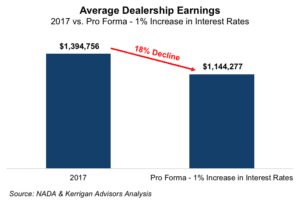Ryan Kerrigan, Managing Director of Kerrigan Advisors, joins CBT Automotive to discuss August’s Kerrigan Index and the market’s strong transaction activity.
The Kerrigan Index™ is composed of the seven publicly traded auto retail companies with operations focused on the US market, including CarMax, AutoNation, Penske Automotive Group, Lithia Motors, Group 1 Automotive, Asbury Automotive Group, Sonic Automotive.
The Kerrigan Index held steady for August with a slight increase of 0.26 percent, as did the S&P which is up 5.5 percent over the course of the year so far. Of the companies included in the index, only Lithia Motors reports substantial loses of 16 percent, although Ryan notes that they have been recently posting back some gains.
In addition, Ryan reports that Q2 profits and general business performance are very strong across the board due to the tax reform passed at the end of 2017 and improving F&I gross margin.
Transaction activity also remains quite strong with transactions up 14% in the first half of the year versus this time in 2017. The biggest shift in publics allocating their cash flow has been doubling their share buy-backs. However, Ryan explains, “Large platform deals and multi-franchise transactions are really becoming the norm in the auto retail industry.”
This ultimately has a large play in which franchises are hot. Ryan points out that GM, Ford, Chrysler are the most traded franchises simply because there are many of them, and they have high returns on investments. These companies with high ROIs and good platforms will also see more opportunities for outside capital as the market tries to consolidate.
Domestics have the largest market share followed by imports and luxury, with luxury having the fasting turnover and domestics the lower proportionally speaking. However, this could shift depending on the future of tariffs and trade which will likely affect OEMs and dealers.
We must also take into consideration rising interests which Ryan says are finally here, and for the first time in a while, there are more interest expenses that affect dealership profits and losses contrasted to interest credits which we’ve been seeing for many years. Dealers need to evaluate and trim interest expenses in order to remain profitable. Rising interest rates will also push down real estate values which on average, are the largest component of the value of the dealership.
Amidst all of the positive growth we see, its still paramount to avoid operational missteps, and adjust your business plan to the ever-changing market.










